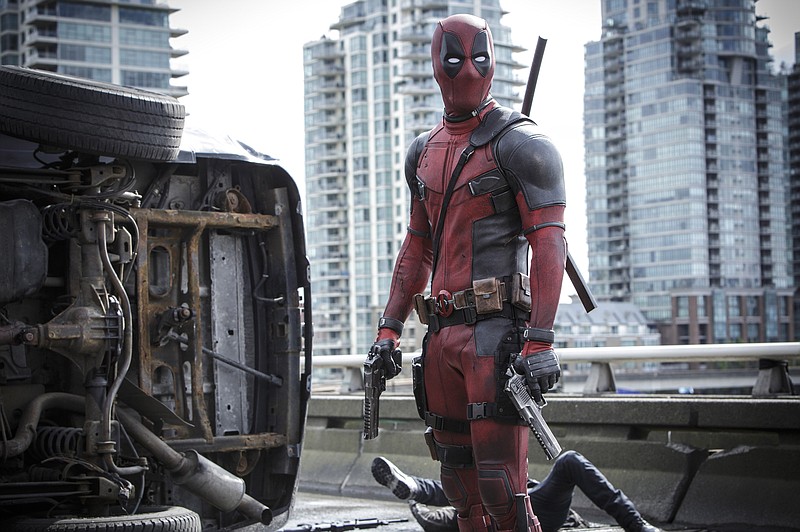'Deadpool'
› Rating: R for strong violence and language throughout, sexual content and graphic nudity.› Running time: 1 hour, 48 minutes.
Every so often a movie comes along that's so bad it seems like the future. "Deadpool" is one of those movies.
It's a disturbing film, in that all the things we might normally attribute to ineptitude - the fractured narrative, the confusing visuals, the repugnant lead character - seem intentional, possibly the harbinger of a new aesthetic. Maybe it doesn't matter anymore that we know what's blowing up, so long as something is blowing up and at regular intervals. Maybe it doesn't matter that we're not made to dislike the characters we see getting killed, so long as some violent death is depicted on screen, which is maybe all audiences want - and all they ever secretly wanted.
"Deadpool" is based on the Marvel Comics character of the same name, created in the 1990s as a sort of postmodern superhero. Unlike other superheroes, he is aware of the superhero genre and his place within it. On screen, he seems to know that he is a fictional character, or at least that he is starring in a movie. Frequently, he looks directly into the camera and talks. In one scene, he even moves the camera himself.
These are distancing strategies, and they make for a cold piece, though one with the occasional laugh. The opening credits are a self-aware spoof of credits, identifying the usual types found in these movies. But at the heart of the film and overarching everything is a creepy assumption, all the more creepy in that it might be true: Audiences will root for the most repellent of characters, so long as that character is identified as the protagonist.
This hasn't always been the case, but it might be now. After all, in this era in which half the public is going around taking and posting pictures of themselves, in which self-love has broken free of all social constraint and shame, and self-forgiveness is infinite, perhaps every protagonist is acceptable. A protagonist on screen is, after all, a kind of second self, the I - and the eye - through which we perceive the world. And since there couldn't ever be something wrong with any of us, well, he must be right in every way.
Thus, when Deadpool announces early on that he's going to kill a bunch of people, we're supposed to think that's interesting, and when we soon see him shooting and butchering various characters on a highway - heads blowing off, etc. - we are either to find this entertaining or assure ourselves that he has his reasons. The reasons will come in any case. In the meantime there is all that spectacle to enjoy, the quick cuts that render action scenes unintelligible and the sprays of blood that make it all worthwhile.
He's an unsavory guy, this Deadpool. In flashback, we meet him in his original incarnation as Wade Wilson (Ryan Reynolds), a bullying ex-military man working as a strong-arm guy for hire, muscling and intimidating people for cash. He talks fast and randomly, as though wires are crossed in his brain. The movie contains a brief, almost-human interlude (five or 10 minutes, tops), in which Wade falls in love with a woman (Morena Baccarin) who is almost as wild as he is. They are so compatible in their combustibility that they're practically on the verge of domesticity, when fate - that is, the plot - intervenes and takes Deadpool in a superhero direction.
It's hardly an exaggeration to say that the rest of the movie is made up of scenes of Deadpool either getting tortured, planning to kill somebody or actually killing somebody. It is colossally uninvolving, neither interesting as filmmaking nor as story. Deadpool has an accelerated healing capacity, so he can't die, no matter how much we might want him to, and so he can't be in peril, which eliminates all suspense.
Ryan Reynolds plays Deadpool with tremendous energy, speaking every line as though he had 12 cups of coffee, but it's all in vain. Deadpool is supposed to be the funny superhero, but really, what's so funny about a character acknowledging that he is in a movie? What's so clever about little references to other superhero movies? It's the easiest thing in the world. You know what's hard? A good story. A well-composed shot. "Deadpool" makes fun of itself when there is barely a self to make fun of. The experience is like listening to people improvising on instruments they cannot play.
This is bad, borderline garbage, but disturbing, too, in that just the kind of fake-clever awfulness that might be cinema's future.
